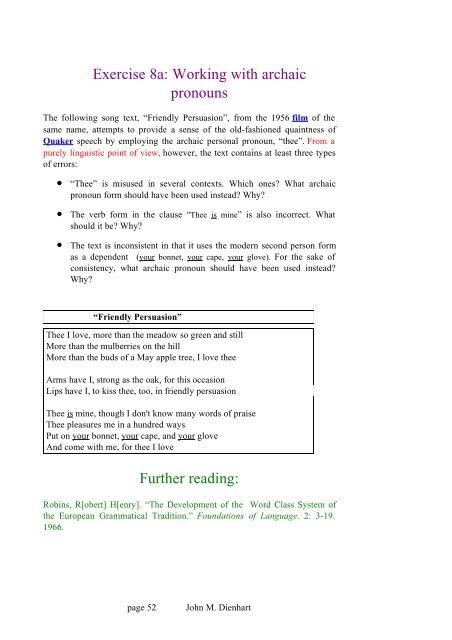Download - VISL
Download - VISL
Download - VISL
You also want an ePaper? Increase the reach of your titles
YUMPU automatically turns print PDFs into web optimized ePapers that Google loves.
Exercise 8a: Working with archaic<br />
pronouns<br />
The following song text, “Friendly Persuasion”, from the 1956 film of the<br />
same name, attempts to provide a sense of the old-fashioned quaintness of<br />
Quaker speech by employing the archaic personal pronoun, “thee”. From a<br />
purely linguistic point of view, however, the text contains at least three types<br />
of errors:<br />
• “Thee” is misused in several contexts. Which ones? What archaic<br />
pronoun form should have been used instead? Why?<br />
• The verb form in the clause “Thee is mine” is also incorrect. What<br />
should it be? Why?<br />
• The text is inconsistent in that it uses the modern second person form<br />
as a dependent (your bonnet, your cape, your glove). For the sake of<br />
consistency, what archaic pronoun should have been used instead?<br />
Why?<br />
“Friendly Persuasion”<br />
Thee I love, more than the meadow so green and still<br />
More than the mulberries on the hill<br />
More than the buds of a May apple tree, I love thee<br />
Arms have I, strong as the oak, for this occasion<br />
Lips have I, to kiss thee, too, in friendly persuasion<br />
Thee is mine, though I don't know many words of praise<br />
Thee pleasures me in a hundred ways<br />
Put on your bonnet, your cape, and your glove<br />
And come with me, for thee I love<br />
Further reading:<br />
Robins, R[obert] H[enry]. “The Development of the Word Class System of<br />
the European Grammatical Tradition.” Foundations of Language. 2: 3-19.<br />
1966.<br />
page 52<br />
John M. Dienhart
















